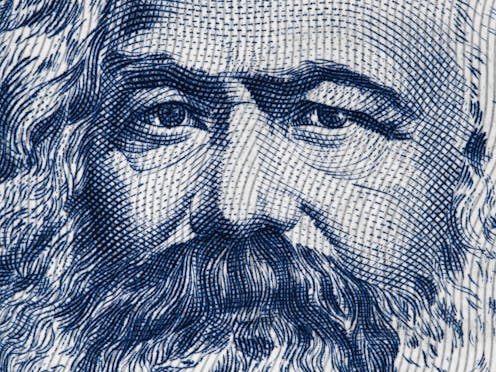Karl Marx: his philosophy explained
- Written by Christopher Pollard, Tutor in Philosophy and Sociology, Deakin University

In 1845, Karl Marx declared[1]: “philosophers have only interpreted the world in various ways; the point is to change it”.
Change it he did.
Political movements representing masses of new industrial workers, many inspired by his thought, reshaped the world in the 19th and 20th centuries through revolution and reform. His work influenced unions, labour parties and social democratic parties, and helped spark revolution via communist parties in Europe and beyond.
Around the world, “Marxist” governments were formed, who claimed to be committed to his principles, and who upheld dogmatic versions of his thought as part of their official doctrine.
Marx’s thought was groundbreaking. It came to stimulate arguments in every major language, in philosophy, history, politics and economics. It even helped to found the discipline of sociology.
Although his influence in the social sciences and humanities is not what it once was, his work continues to help theorists make sense of the complex social structures that shape our lives.
Read more: Explainer: the ideas of Foucault[2]
Economics
Marx was writing when mid-Victorian capitalism was at its Dickensian worst, analysing how the new industrialism was causing radical social upheaval and severe urban poverty. Of his many writings, perhaps the most well known and influential are the rather large Capital Volume 1 (1867) and the very small Communist Manifesto (1848), penned with his collaborator Frederick Engels.
On economics alone, he made important observations that influenced our understanding of the role of boom/bust cycles, the link between market competition and rapid technological advances, and the tendency of markets towards concentration and monopolies.
Marx also made prescient observations regarding what we now call “globalisation[3]”. He emphasised “the newly created connections […] of the world market” and the important role of international trade.
At the time, property owners held the vast majority of wealth, and their wealth rapidly accumulated through the creation of factories.
Read more https://theconversation.com/karl-marx-his-philosophy-explained-164068
















